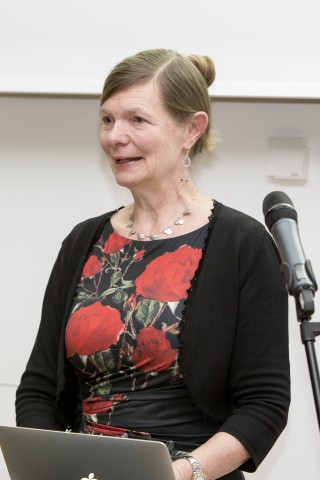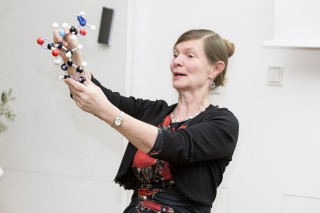How much of a scientific career is planning, how much is networking, how much destiny or pure luck? Prof. Elspeth Garman from the University of Oxford, UK, is a passionate scientist, an expert in the field of macromolecular crystallography and a dedicated teacher who has been awarded prestigious prizes for her accomplishments – among them the Mildred Dresselhaus Guest Professorship 2015. When she came to Hamburg for the prize ceremony, she gave insight into her path. Her career is marked by boldness, enthusiasm and a bit of chance.

Prof. Elspeth Garman during the Mildred Dresselhaus Award ceremony
Garman recalls an incident in her life, which has changed her career dramatically: Teaching physics at Somerville College, Oxford in 1987, she was asked by Prof. Louise Johnson to have a look at the Laboratory of Molecular Biophysics (LMB) and meet with people. “I knew they were searching for someone to look after their new X-ray generator and electronic X-ray detector. But I thought this was just an informal meeting.” Out of the blue she was asked a lot of strange questions and her wish to work part-time was challenged. A few days later she called the LMB office, to inquire about the application formalities for the job – which left the secretary bewildered. Apparently there was a misunderstanding: It turned out she already had the job without applying. Garman: “That was total destiny or chance.”
Everybody in her family was expected to mend things
However, her interest in physics is deeply rooted in her childhood and inspired by a Church of England nun with whom she is still in touch. “If Sister Janet Elizabeth had been a chemist, I would have been a chemist,” she says. However, everybody in her family was expected to mend things and at the age of 11 she even built her own telescope. “This was part of life,” Garman states, who later became an expert in complicated machines and coding computers. In the beginning, male colleagues in Oxford thought her too weak to move the helium gas cylinders and use the workshop. They didn’t know she was a rower: “It was alright as soon as I showed how strong my muscles were.”
Another part of life was the year she spent teaching in Africa before her Physics degree. “I was always encouraged by my parents to care for others,” she recalls. But Africa changed her outlook on life even more, influencing her attitude in the scientific community as well. Garman became a passionate teacher who loves to see the curtains open in young people’s faces. In return she gets a lot of support from below, like the student award for the most acclaimed lecturer in the Oxford Medical Sciences Division.
“You have part of my time but all of my brain”
However, Garman admits that she herself learned some of the necessary lessons very late. As a mother of two daughters plus a Swazi foster daughter and taking care of her mother-in-law, she worked part-time for 12 years or, as she puts it: “I worked full-time for two-thirds pay.” Due to her experience she developed what she calls her magic line: “You have part of my time but all of my brain.” So when asked as a mentor she tells women to give it a go and not to feel too bad when things don’t work out: “It’s hard to put yourself forward because you risk failure, but you have to be bold and enthusiastic, you have to say that you want to talk at a conference, you have to apply – applying makes a big difference.” Encouraged by Louise Johnson she became a Reader in Oxford in 2002, and supported by her international collaborators applied for the title of Professor in 2008 – and got it. In 2009 she was seconded 50% time for 5 years from Oxford University’s Medical Sciences Division to the Maths, Physics, & Life Sciences Division Doctoral Training Centre, as Director of first the Life Sciences Interface and then the Systems Biology Programmes. From 2009 to 2012 she was President of the British Crystallographic Association. In 2016 she will receive the Fankuchen Award of the American Crystallographic Association.

Credit: UHH, RRZ/MCC, Arvid Mentz
Right now she has just written a section for the Oxford Dictionary of National Biography about Louise Johnson – the woman and friend who had such a huge effect on her life. During spring and summer Garman will spend several weeks in Hamburg and she is already full of plans how to help with students.
BBC radio 4: The Life Scientific
Department of Biochemistry, University of Oxford, Elspeth Garman

